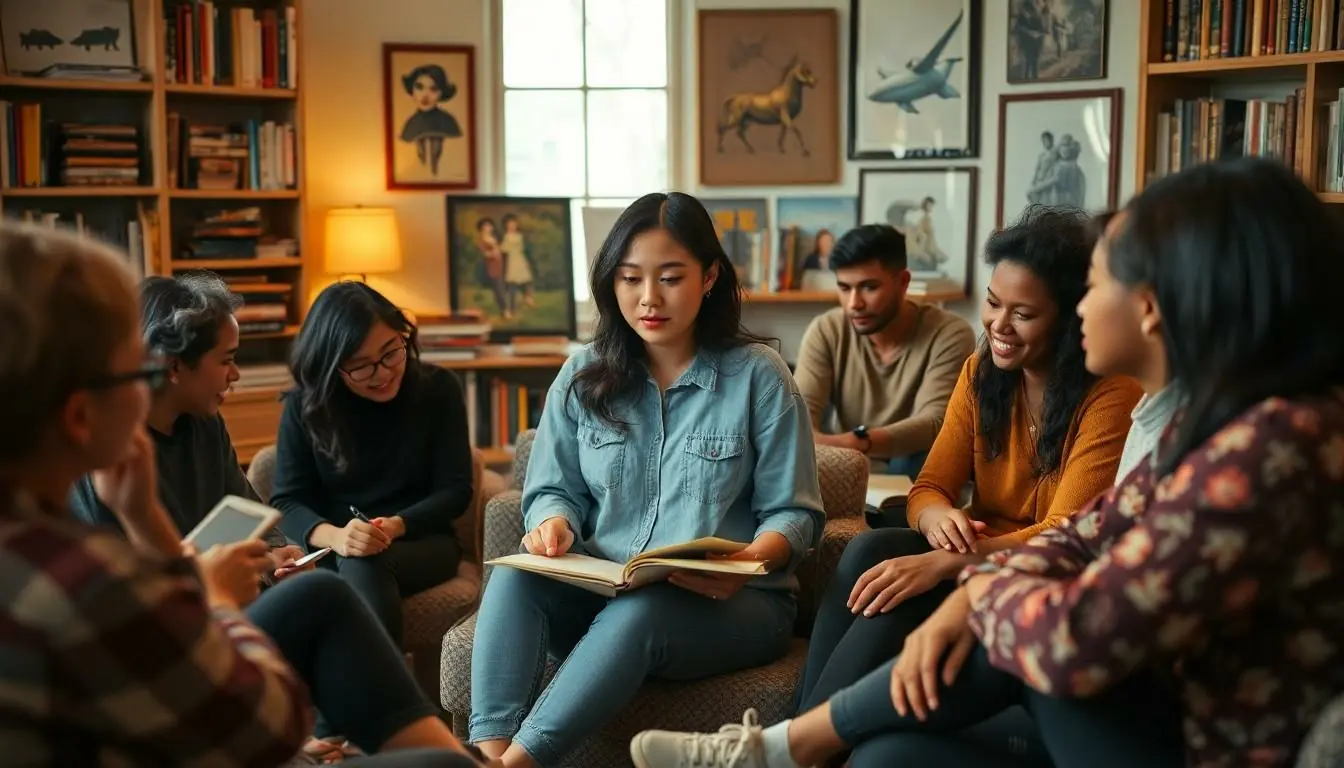In a world where deadlines loom and inspiration can strike at the most inconvenient times, low residency MFA programs in creative writing offer a lifeline for aspiring authors. Imagine honing your craft while sipping coffee in your favorite pajamas, surrounded by the comforting chaos of home. These programs blend the best of both worlds, allowing students to study remotely while gathering for intensive workshops that ignite creativity and foster collaboration.
But wait, there’s more! With low residency options, writers can escape the shackles of traditional classroom settings without sacrificing quality education. It’s like having your cake and eating it too—if your cake were a well-crafted novel. So, if you’re ready to unleash your inner wordsmith while balancing life’s other demands, a low residency MFA might just be your ticket to literary greatness.
Table of Contents
ToggleOverview of Low Residency MFA Creative Writing
Low residency MFA programs in creative writing offer a unique educational approach that prioritizes flexibility and independence. Students immerse themselves in intensive summer workshops, often lasting one to two weeks, where they engage deeply with peers and faculty. Remote study occurs during the remaining semesters, allowing writers to work on their craft from home or any preferred location.
Personal writing projects receive focused attention through feedback from experienced mentors. Students typically participate in one-on-one advising sessions, fostering significant growth and development as authors. Virtual workshops create space for collaboration, encouraging participants to share ideas and critiques effectively.
Many programs emphasize genre diversity, including fiction, poetry, and creative nonfiction. A vibrant community often forms among students, leading to lasting friendships and supportive networks. Through this structure, participants cultivate essential skills, such as critical analysis and effective communication.
Structured deadlines play a critical role in keeping students accountable, ensuring consistent progress. Programs generally require regular submissions of new work, which helps to maintain motivation and discipline. Additionally, numerous schools integrate opportunities for publishing and networking with literary professionals.
A diverse faculty typically comprises published authors and industry experts, enriching students’ learning experiences. Students benefit from varying perspectives, gaining insights into different writing styles and publishing avenues. Overall, low residency MFA programs deliver a comprehensive education tailored to the needs of aspiring writers in a balanced manner.
Benefits of a Low Residency Program

Low residency MFA programs in creative writing provide several distinct advantages for aspiring authors. These programs deliver essential support while accommodating individual schedules and commitments.
Flexibility and Convenience
Flexibility defines the low residency structure. Students can balance writing with personal or professional responsibilities. Immersive workshops offer intensive periods of focus, while remote study allows for independent work. With this model, writers submit projects during regular semesters and receive timely feedback from mentors. This combination fosters a productive writing environment, encouraging continuous development without the constraints typical of traditional formats. Convenience emerges through the ability to tailor coursework to fit unique lifestyles, ultimately making the journey toward a degree more accessible.
Networking Opportunities
Networking opportunities abound in low residency MFA programs. Students connect with published authors and industry professionals through workshops and virtual collaboration. Furthermore, intimate class sizes enable meaningful conversations that inspire creativity. These connections often lead to invaluable feedback and support throughout a writer’s career. Participation in literary events and online forums enhances community engagement and paves the way for future collaborations. As writers build relationships within the literary world, they add essential contacts that can assist in securing publication opportunities or mentorships.
Curriculum Structure
Low residency MFA programs in creative writing offer a well-rounded curriculum that balances core courses with electives and workshops.
Core Courses
Core courses form the backbone of the curriculum. They cover essential topics in creative writing, such as narrative structure, character development, and poetry techniques. Each student participates in workshops designed to refine their writing skills through peer feedback and instructor guidance. These courses often focus on different genres, ensuring a comprehensive understanding of fiction, poetry, and creative nonfiction. Students enhance their craft while grasping theoretical concepts and practical applications of writing.
Electives and Workshops
Electives provide additional freedom for specialized exploration. Students select courses that align with their individual interests, allowing them to delve into specific areas like writing for children or screenwriting. Workshops complement the electives, reinforcing collaborative learning through group critiques and discussions. These interactive settings foster creativity and build a supportive community among aspiring writers. Students engage with diverse genres and explore various literary techniques, nurturing a dynamic writing practice. Networking opportunities frequently arise, helping students connect with industry professionals and cultivate meaningful relationships.
Faculty and Mentorship
Low residency MFA programs in creative writing feature a diverse faculty composed of published authors, scholars, and industry professionals. This faculty brings a wealth of experience that enhances the learning process. Mentorship plays a central role in the educational approach, providing personalized guidance tailored to each student’s unique writing journey.
Students benefit from one-on-one advising sessions, allowing for focused feedback on individual projects. Such sessions facilitate deep discussions about story development, character arcs, and thematic exploration. Faculty members often teach specific genres, such as fiction, poetry, or creative nonfiction, which broadens students’ exposure to various writing styles.
Collaboration thrives within these programs through workshops led by faculty. Energetic discussions about peer work foster a communal learning environment, stimulating creativity and innovation. Faculty support does not stop at workshops; they often assist with career development, teaching students how to navigate publishing pathways.
Availability of experienced mentors also encourages students to pursue their artistic visions while keeping them accountable. Faculty’s ongoing engagement helps nurture a productive atmosphere that enhances writers’ growth. Oftentimes, students find their connections with faculty evolve into lasting professional relationships.
In addition to traditional mentorship, some programs offer opportunities for guest lectures and workshops with notable authors. Exposure to outside professionals expands students’ networks, providing insights into the literary world. With such comprehensive support, low residency MFA programs equip aspiring writers with the tools, inspiration, and guidance needed to thrive in their craft.
Student Experience
Low residency MFA programs provide a unique environment for aspiring writers to grow and thrive. Students enjoy a blend of independence and structured engagement, allowing for a rich learning experience.
Community and Support
Students benefit from a strong sense of community, even in a primarily remote format. Virtual workshops facilitate collaboration among peers, promoting feedback and creative exchange. Faculty members foster an inclusive atmosphere, ensuring students feel connected and supported. One-on-one mentorship enhances this support system, giving individuals personalized guidance tailored to their needs. Connections formed during intensive workshops can lead to lasting friendships and professional networks. Overall, the collaborative spirit nurtures creativity and helps writers push their limits.
Challenges Faced by Students
Students encounter specific challenges, often linked to the nature of low residency programs. Balancing remote study with personal commitments can be demanding. Self-discipline becomes crucial, as maintaining motivation without direct supervision is essential. Isolation may arise during the semester, making ongoing communication with peers and mentors important. Additionally, navigating feedback and incorporating edits into writing requires resilience and openness. Understanding these challenges allows students to develop strategies that enhance their writing journey while fostering growth and creativity.
Low residency MFA programs in creative writing offer a unique blend of flexibility and rigorous education. They cater to aspiring authors who seek to hone their craft while juggling other life commitments. The immersive workshops and personalized mentorship create an environment that fosters creativity and growth.
Students benefit from diverse genres and collaborative learning experiences that enhance their writing skills. With a supportive community of peers and faculty, they gain invaluable insights and connections in the literary world. Embracing the challenges of self-discipline and remote study ultimately leads to significant personal and professional development. These programs stand out as an excellent option for those committed to their writing journey.



